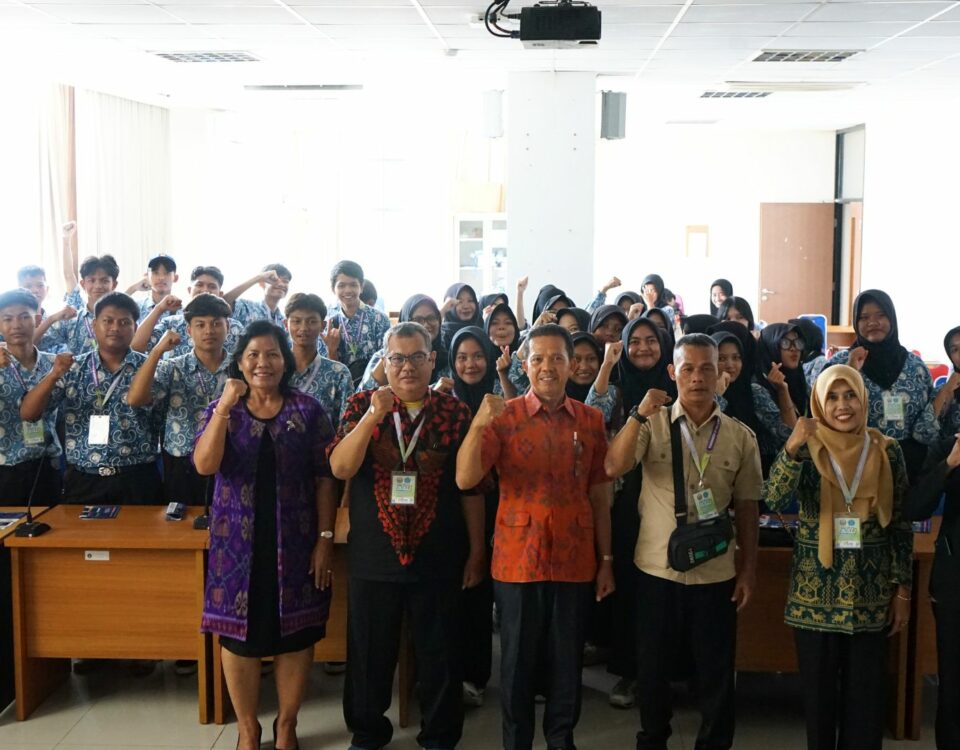Singaraja- A series of commemorations of the 24th National Technology Awakening Day (Hakteknas), Minister of Research, Technology and Higher Education (Menristekdikti), Prof. H. Mohamad Nasir, Ph.D.Ak., made a working visit to the Ganesha University of Education (Undiksha), Tuesday (20/8/2019). In addition to giving a public lecture on Campus Life Orientation (OKK) for new students, the Menristekdikti also inaugurated a drinking water filter machine, a business incubator on the central campus, inaugurated a tropical fruit plantation on the Jinengdalem Campus, Buleleng District/Regency, and also handed over several technological innovation products to the government and the people of Bali.
At the service of technological innovation, Minister Mohamad Nasir handed over 1 unit of TROLLS (Android-based Hand Tractor) produced from the STIKOM Bali incubator, 10 Automatic Wheel Chairs with Android Smartphone control produced from the P3M – PPNS incubator, 20 Ponkod (Coconut Climbing Aid) produced by tenants from STMIK Primakara incubator, 10 Bali 2 in 1 3D printer produced by tenants from the STIKI Indonesia incubator, 2,400 bottles of Pupuk Hayati Plus (Biofarm) which is an innovation product from the University of Muhammadiyah Malang in collaboration with CV. Biocell Agrosolus. There are also 2,400 tropical fruit seeds (durian, longan, avocado) which are innovative products from IPB in collaboration with PT. BLST IPB. “This Technology Innovation Service is a form of Kemenristekdikti’s responsibility to the community from the work of the nation’s children in implementing innovative products in an effort to increase the added value of the community’s economy,” he explained.
Meanwhile, the ready-to-drink water management center was the result of an innovation by UPN Veterans East Java which was handed over to Undiksha. The product is a multifunctional filtration system, a new breakthrough used for making ready-to-drink water equipped with a cartridge and ultra-filtration called technofiltration. The machine is expected to continue to be developed so that its use becomes more massive. “This can also be installed in the faculty,” he hoped.
On this occasion, it was also emphasized that universities have a very important role in overcoming problems in society. His party is pushing ahead for more technology-based innovations, including working on research results downstream. Not just doing research and stopping at scientific publications. This is one of the strategies to increase competitiveness and hope for the industrial revolution 4.0. “Higher education must be beneficial to society. Must be able to innovate. It has to be able to support development,” he said.
Chancellor of Undiksha, Prof. Dr. I Nyoman Jampel, M.Pd., said that Undiksha had so far been committed to following the policies of the Ministry of Research, Technology and Higher Education, including establishing a business incubator. According to him, the incubator is one of the strategies to maximize the downstream research results of Undiksha academics. Such as the development of sea grapes, grape-processed wine, crafts made from bamboo waste, as well as a number of products initiated through community service. These products are expected to enter the industrial sector. “Before entering the industry, these research products are handled first in the incubator. With this, the interest of researchers to produce products can increase,” he explained.
Regarding the ready-to-drink water management center, Jampel said this was a form of support for the government in reducing the use of plastic waste. “All campus residents can consume the water. Campus residents only need to bring a tumbler and no longer use single-use plastic bottles,” he said. This breakthrough is also a form of implementing the Tri Hita Karana philosophy which is also the basis for realizing Undiksha’s vision as a leading university in Asia in 2045. Namely maintaining good relations with the environment.
Specifically for planting tropical fruit seeds, it is carried out on an area of 3.5 hectares. This planting was the starting point for the development of an orchard-scale orchard on Undiksha’s land. This fruit orchard would later become a place of learning for the Balinese people in managing orchards on an industrial scale. (hms)





